Margaret Chase Smith: The First Senator to Confront McCarthy
On September 13, 1948, Margaret Chase Smith was elected to the Senate, making her the first woman to serve in both houses of Congress.
Smith was the first woman elected to the Senate on her own merit. Six women had served in the Senate before she arrived there in 1948 (including one who served for a single day), but each of her predecessors had been chosen to complete the term of a man, often their recently deceased husbands. This was how Smith herself entered politics, but not what kept her going.
As the Post reported it in 1948 in “Senator from the Five-and-Ten,” her husband, Maine Congressman Clyde Smith, suffered a heart attack in 1940 just before filing for the upcoming primary election to run for a third term. His doctor advised him to have his politically savvy wife file instead. If Clyde got better, she could step down from the campaign, and he would replace her.
But Clyde Smith died soon afterward. In a special election, Margaret Smith was chosen to complete the remainder of his term, launching her political career as Maine’s newest Congressional representative. She won the general election the following September.
In 1947, Maine’s incumbent Senator Wallace White Jr. announced that he would retire when his term was over in 1948. Smith decided to run. In the Republican primary — which was tantamount to the election itself — she received more votes than the other three male candidates combined.
Her gender was not the only notable thing about Smith. In 1950, she publicly denounced Senator Joe McCarthy for promoting himself and silencing his critics by playing on America’s Cold War fears, four years before most of her colleagues did so. The Senate wouldn’t vote to censure him for behavior “contrary to senatorial traditions” until 1954.
Like her colleagues, Smith had initially been impressed when McCarthy first announced he had the names of hundreds of communist agents working in the federal government. He promoted the idea of a vast communist conspiracy within the country and himself as America’s best defense against it. Senator Smith challenged him to release the names, but he refused.
So on June 1, 1950, she delivered a Declaration of Conscience to her colleagues. Co-signed by six other moderate Republicans, it denounced McCarthy’s slandering and fearmongering, which he hid behind a façade of patriotism. She said:
I do not like the way the Senate has been made a rendezvous for vilification for selfish political gain at the sacrifice of individual reputations and national unity.
Those of us who shout the loudest about Americanism in making character assassinations are all too frequently those who, by our own words and acts, ignore some of the basic principles of Americanism: the right to criticize; the right to hold unpopular beliefs; the right to protest; the right to independent thought. The exercise of these rights should not cost one single American citizen his reputation or his right to a livelihood.
I don’t want to see the Republican Party ride to political victory on the Four Horsemen of Calumny—Fear, Ignorance, Bigotry, and Smear. … Surely we Republicans aren’t that desperate for victory.
Her declaration was not warmly received, and McCarthy soon took his revenge by removing Smith from the powerful Permanent Subcommittee on Investigations. He also gave financial support to a Republican who unsuccessfully challenged Smith’s re-election. But Smith prevailed, retaining her Senate seat until 1973.
Smith is also remembered as the first woman to gather any noticeable support for a presidential bid in a major political party. In 1964, she announced her candidacy for the Republican nomination. Many Americans laughed at the idea. But President Kennedy took her candidacy seriously, telling reporters she would be a formidable opponent.
He probably remembered her voice raised against McCarthy years earlier. It was act of courage and integrity, two qualities Americans like in their presidents. And, as the financier Bernard Baruch said, if a man had delivered her Declaration of Conscience, “he would be the next president.”
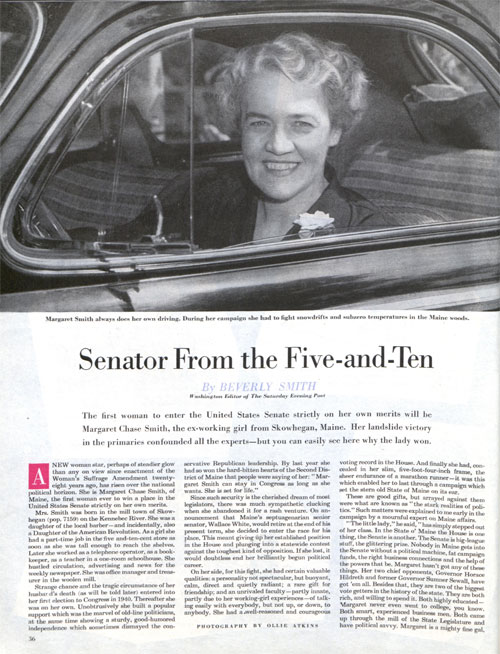
Featured image: Photo by Ollie Atkins for “Senator from the Five-and-Ten,” from the September 11, 1948, issue of the Post.
The Saturday Evening Podcast No. 1: The Rise of Women in Politics
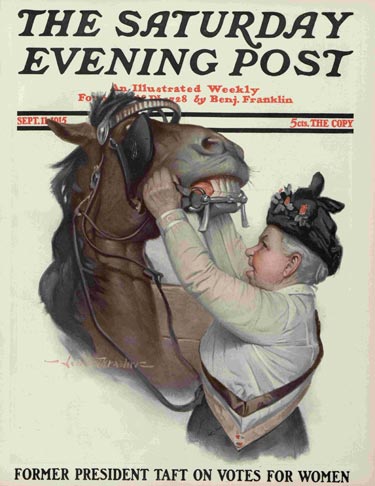
Regardless of who wins, the 2016 presidential election has broken new ground in American history. For the first time ever, a major political party nominated a woman, Hillary Rodham Clinton, as its presidential candidate. Seeing a woman’s name on the ballot has been a long time coming, and in this podcast, Jeff Nilsson and Andy Hollandbeck talk about just how long it’s been and how we finally got here.
In this podcast, Jeff interviews Nancy L. Cohen, author of Breakthrough: The Making of America’s First Woman President. You’ll also hear the words of President William Howard Taft; Susan B. Anthony II, grandniece of the famed feminist and suffragist; Margaret Chase Smith, who in 1964 campaigned for the Republican Party’s presidential nomination; Shirley Chisholm, who campaigned for the presidency in 1972; and current U.S. Representative Marsha Blackburn of Tennessee.
Listen to the podcast on SoundCloud.
The following supplementary materials can help you dig into the information we talk about in the podcast.
The World Bank website allows you to sort and visualize (as well as download) the Inter-Parliamentary Union’s data on the “proportion of seats held by women in national parliaments” in a number of ways.
From the Fourth Estate, this “Female Voices in Media” infographic shows a surprising gender gap in who was quoted in stories about women’s issues during the 2012 election.
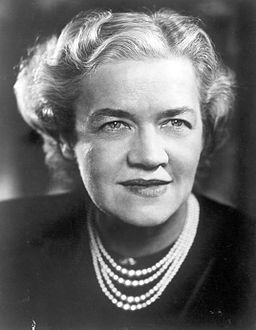
Margaret Chase Smith was the first woman to serve in both houses of Congress. She represented Maine in the House of Representatives from 1940 to 1949 and in the Senate from 1949 to 1973. In 1964, she ran against Barry Goldwater for the Republican Party’s presidential nomination. Goldwater won but was defeated in a landslide by democrat Lyndon B. Johnson in the general election. One wonders what the electoral count would have looked like if Smith had been the party’s candidate.
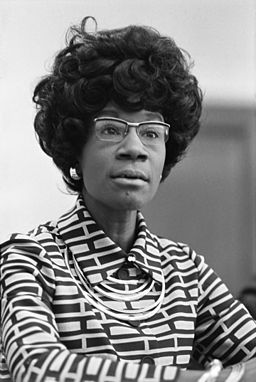
New York’s Shirley Chisholm was the first African-American woman elected to Congress, serving in the House of Representatives from 1969 to 1983. In 1972, she became the first African American to run for the presidential nomination in a major political party. The Democratic Party instead chose George McGovern, who was soundly defeat in the general election by Richard Nixon. In 2015, Chisholm was posthumously award the Presidential Medal of Freedom.
In 1948, the grandniece of Susan B. Anthony looked back at what women had accomplished politically since women’s suffrage had passed, She was not impressed. She wrote “We Women Throw Our Votes Away” for the post that year.
Google’s NGram viewer shows that the phrase “gender role” was practically nonexistence before 1956. Throughout the ’60s, the phrase become much more common in print.
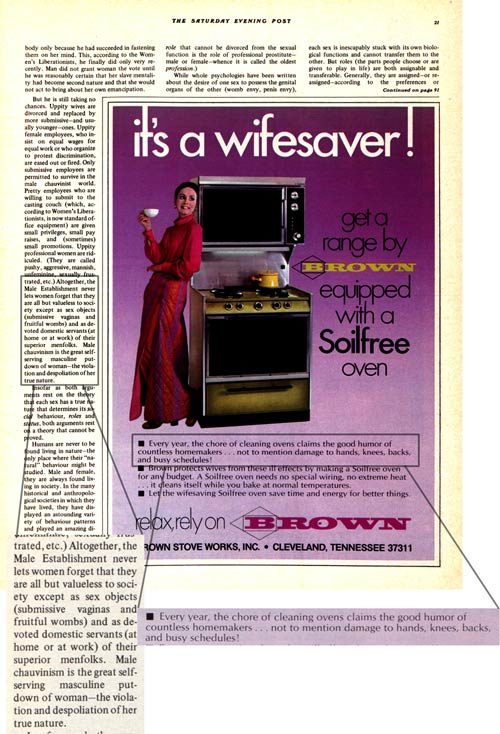
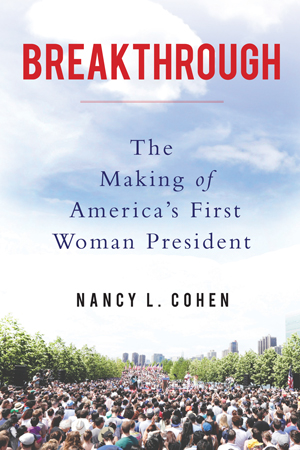
By Nancy L. Cohen
Nancy L. Cohen’s book, Breakthrough: The Making of America’s First Woman President, draws from hundreds of hours of interviews with women governors, Senators, experts, operatives, and a diverse array of voters to explore why women’s leadership matters and how the history of women’s rights activism culminated in the nomination of Hillary Rodham Clinton for president of the United States.
Sound files heard in the podcast:
- “Hail to the Chief” played by the U.S. Army Ceremonial Band
- “Respect” by Aretha Franklin, 1967
- “Woman in the White House” by Sheryl Crow, 2012
- “Margaret Chase Smith” at the Women’s National Press Club, January 27, 1964
- Katie Couric interviews Rep. Marsha Blackburn, May 19, 2014
- “Hail to the Chief” performed by the Mormon Tabernacle Choir, 1973
If you enjoyed this podcast, you might also like:
Susan B. Anthony, Illegal Voter
Against Her Self-Interest: An Anti-Suffragist Admits Her Mistake
